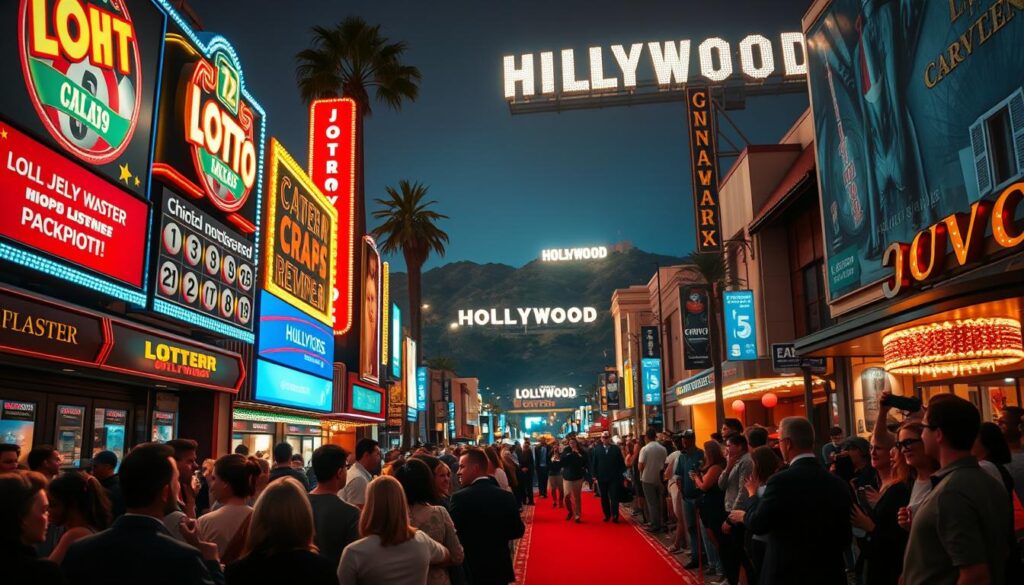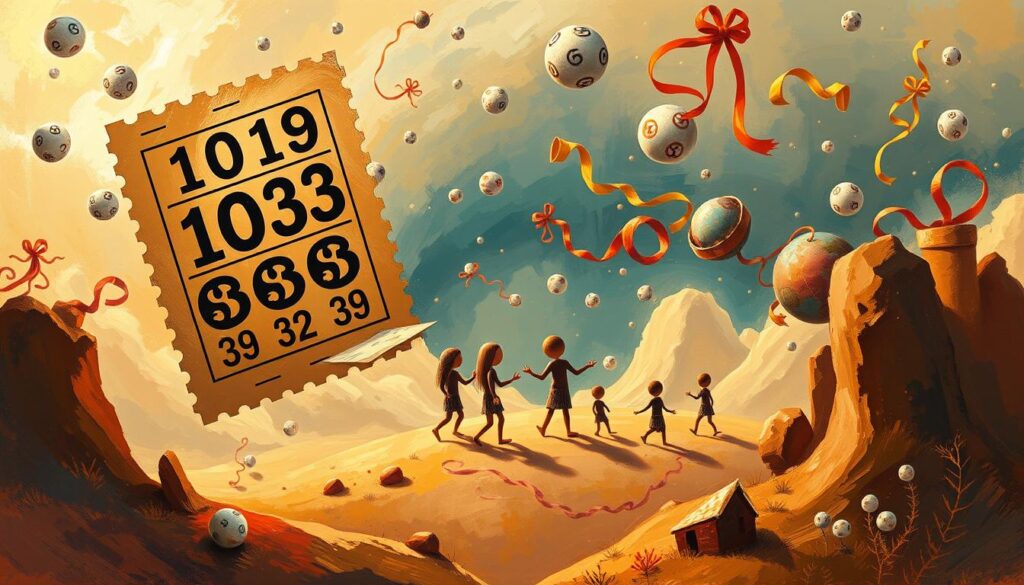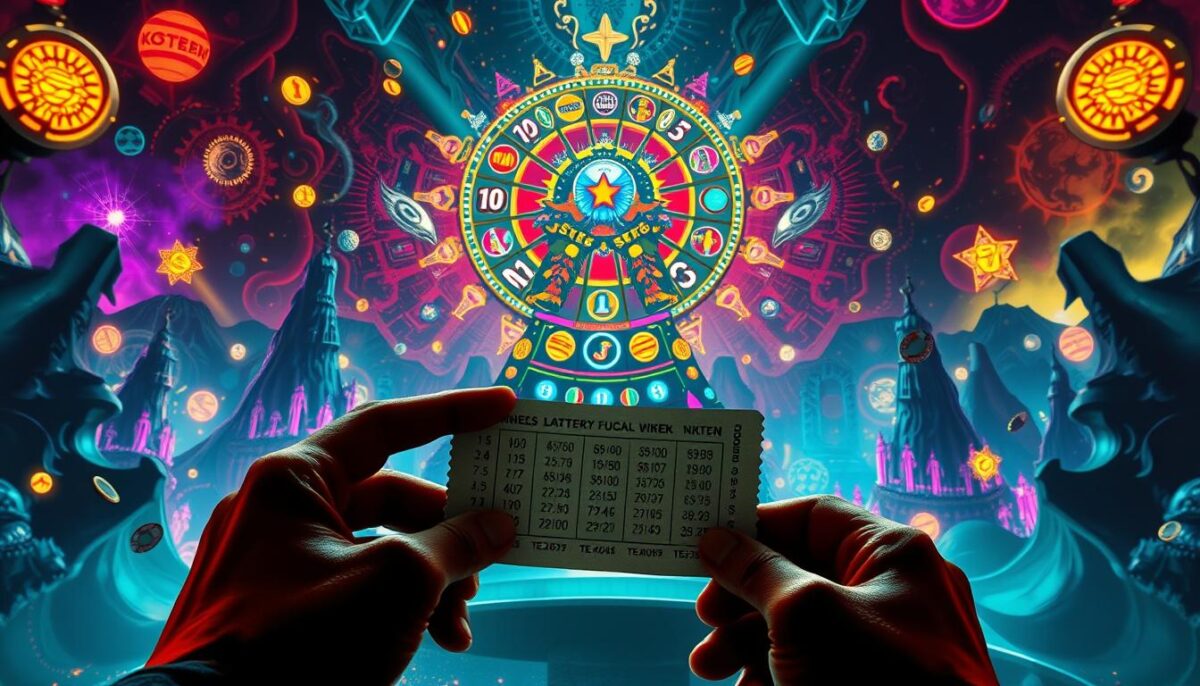We’re excited to explore the world of lottery mythology and its lasting impact on pop culture. We’ll look at how the lottery shapes our society and appears in media. This includes its influence on culture and legacy.
The lottery has been around for centuries, starting in ancient times. It has changed a lot, affecting our culture, pop culture, and legacy. Many films, books, and art pieces talk about or show lottery themes.
Key Takeaways
- The lottery has a big impact on pop culture, with many films, books, and art pieces referencing or featuring lottery themes.
- The lottery’s roots in ancient civilizations have influenced its evolution over time, shaping its legacy and mythology.
- The lottery’s representation in different forms of media has contributed to its lasting imprint on pop culture.
- The lottery’s influence on our culture and society is a fascinating topic, worthy of exploration and examination.
- Understanding the lottery’s mythology and legacy can provide valuable insights into its enduring appeal and popularity.
The Ancient Origins of Lottery Systems
We explore the history of lottery systems, looking at how ancient civilizations used games of chance. They were used for fundraising and making decisions. The history of lottery systems goes back to ancient times. We see evidence of gambling rituals in cultures like the Egyptians and Greeks.
Looking at how lottery systems have evolved, we see they’ve been shaped by many factors. Social, economic, and cultural needs have influenced their development. This has led to the wide variety of games we have today.
- The use of lottery-like systems in ancient China for military conscription and funding public works projects.
- The establishment of lottery systems in ancient Rome for fundraising and entertainment purposes.
- The use of gambling rituals in ancient Greece for decision-making and fundraising.
By understanding the ancient origins of lottery systems, we can see their importance today. We also see how they continue to evolve over time.
Unlocking the Lottery’s Pop Culture Mythology and Legacy in Modern Media
We’re excited to dive into how the lottery is shown in today’s media, like movies, books, and art. The course “SBU 102.115: History Through Pop Culture” and the book “A World of Fiction: Digital Collections and the Future of Literary History” offer great insights. By looking at how the lottery is depicted in popular culture, we can understand its deeper meanings and cultural importance.
The lottery is a big part of pop culture, seen in many films and books. For instance, “Lucky” tells the story of a man who wins big and faces new challenges. “The Lottery” by Shirley Jackson shows the darker side of lottery culture. These stories show how the lottery has shaped modern media and lottery mythology.
Some notable examples of lottery-themed media include:
- Films like “Lucky” and “The Lottery Ticket”
- Books like “The Lottery” and “The Winning Ticket”
- Art pieces that use lottery tickets as a medium
These examples show the lottery’s diverse representation in modern media and add to its pop culture mythology.
The Psychology Behind Lottery Dreams
We explore the psychology of why people play lottery games. The draw of lottery dreams is complex, shaped by possibility thinking and social psychology. Our study is informed by courses like “SBU 102.102: Be(coming) a Changemaker” and literary works like “A Sentimental Education”. These offer insights into human behavior and decision-making.
The desire for a better life drives people to play the lottery. This is fueled by lottery dreams of winning big. The anticipation of a big win can stir strong emotions. Possibility thinking is key, as people believe they can win, keeping them playing.
Several factors influence lottery behavior:
- Social influence: What others do can affect our decision to play.
- Group dynamics: Being in a group that plays can make us more likely to play too.
- Cultural norms: Our culture shapes our views on lottery games and our participation.
Understanding the social psychology of lottery play helps us see the complex factors at play. As we dive deeper into lottery dreams, we may learn more about what drives people to play. This could help us make better choices about our own lottery play.
Hollywood’s Love Affair with Lottery Stories
We’ve always dreamed of winning big, and Hollywood has made many lottery stories to capture our dreams. The film industry has long featured lottery-themed movies. These movies use the lottery to explore luck, chance, and what it means to be human.
The allure of lottery stories in Hollywood comes from our deep desire for wealth and success. Who wouldn’t dream of winning a huge jackpot and living a life of luxury? The film industry has answered this dream with a variety of movies, from romantic comedies to thrilling dramas.
Some movies, like “Lucky” and “The Lottery,” show the challenges of winning big. They warn us about the importance of managing our money wisely and the risks of sudden wealth.

Hollywood also uses lottery stories to look at the human condition. Movies like “It Could Happen to You” and “Windy City” see the lottery as a symbol of hope and chance. These films inspire us, showing that with luck and determination, anything is possible.
In summary, Hollywood’s fascination with lottery stories shows our shared dream of winning big. The film industry has made many movies about lottery wins. Whether you love romantic comedies or thrilling dramas, there’s a lottery story for you.
Lottery Superstitions and Ritual Behaviors
We explore the world of lottery superstitions, where lucky numbers and rituals are key. About 70% of players believe in these superstitions. They often wear lucky clothes or pick certain numbers before buying tickets.
Players who believe in luck play more often than those who don’t. States with more lottery players also have more superstition. Cultural variations in lottery beliefs are interesting, showing how different societies play the game.
A survey showed 80% of regular players have a favorite number. This number often holds personal or cultural significance. Also, 55% think some days are luckier for buying tickets, with Fridays and Saturdays being top choices.
Some use birthdates or anniversaries to pick numbers. Modern practices also include technology, like online tools and apps. We’ll look at how technology has changed the lottery.
- 60% of players engage in specific rituals or behaviors before purchasing tickets
- 40% of players have a preferred set of numbers they use consistently
- 70% of players believe that certain days of the week are luckier for playing the lottery
By studying these lottery superstitions and ritual behaviors, we understand more about players. We see how cultural variations and modern practices influence the lottery.
The Social Impact of Lottery Culture
The lottery has a big impact on communities. It has been around for centuries, changing how people connect and identify themselves. In the U.S., the Florida Lottery has made billions of dollars for schools and jobs since 1986.
The lottery brings people together, but it also has downsides. Problem gambling is a big issue, leading to addiction. To help, many lotteries are starting programs to keep gambling safe. These include self-exclusion and spending limits.
Here are some key points about the lottery’s impact:
- Community development: Lottery money helps with schools and buildings.
- Job creation: The lottery creates jobs, like selling tickets and managing offices.
- Social equity: The lottery can hurt those who don’t have much money, as they spend more of their income.
In summary, the lottery’s impact is both good and bad. It helps communities and creates jobs but also causes problems like addiction. We need to focus on making gambling safer and fairer for everyone.
Digital Age Transformation of Lottery Gaming
We live in a digital age where technology has changed how we play lottery games. Online platforms, social media, and mobile apps have made playing lottery games easier and more fun. At DEWAKOIN, we aim to offer a safe, fun, and rewarding online gaming experience.
The digital age has brought new chances for lottery gaming. Online platforms offer more games and are more convenient. Social media has also changed lottery culture, letting players share and connect with others. We think virtual reality will make games even more exciting and interactive.
Some key benefits of digital lottery gaming include:
- Increased convenience and accessibility
- A wider range of games and betting options
- Enhanced security and fairness
- Greater social interaction and community engagement
We’re excited about the future of lottery gaming. Emerging technologies like virtual reality could change how we play games. Virtual reality could make games more immersive and interactive.
Literary and Artistic Representations
We dive into the world of art and literature, where lottery themes have sparked many creative works. From old novels to new installations, the lottery has inspired artists and writers. They use it to explore what it means to be human.
Authors like Shirley Jackson have tackled the lottery’s darker side. Her story, “The Lottery,” shows the dangers of following tradition without question. It has been made into films and plays, still warning us today.
Art also reflects the lottery’s themes, in paintings and sculptures. These pieces often symbolize chance and fate. They help us understand the lottery’s role in our culture and its effects on society.

Global Variations in Lottery Traditions
We’re excited to dive into the world of lottery traditions. Here, global variations and cultural differences blend to offer a unique gaming experience. From Asia to Europe and America, each area has its own special lottery traditions. These traditions show off the local culture and history.
In some Asian countries, lottery games are a big part of traditional festivals. In Europe, lottery games have a long history going back to the Middle Ages. In America, the lottery has changed over time, with different states having their own games.
- Historical and cultural influences
- Local laws and regulations
- Economic and social factors
By understanding these factors, we can see the rich diversity of lottery traditions worldwide. We can also see how they’ve changed over time.
Conclusion: The Enduring Appeal of Lottery in Society
We’ve looked at the lottery’s history and why it’s still popular today. The enduring appeal of the lottery comes from its promise of hope, chance, and community. It deeply affects society, shaping culture and helping people grow.
The lottery has been around for centuries, captivating people with its excitement and chance to win. Looking ahead, the lottery will likely remain a big part of our lives. Its conclusion shows it can change and stay relevant. The lottery in society will keep sparking conversations about its role in our communities.
In conclusion, the lottery has a special power to unite people. It offers a sense of community, hope, and excitement. As we go forward, the lottery will likely stay with us, leaving a lasting mark on society.
Future Prospects and Opportunities
The lottery industry is set for big growth and innovation. New technologies and changing consumer habits bring new opportunities. We’ll look at the future prospects of the lottery, including digital transformation, social responsibility, and community engagement.
The lottery’s role in shaping gaming and entertainment’s future will be discussed. It has the chance to keep inspiring, educating, and entertaining people worldwide.
Virtual reality and augmented reality could change the lottery game. They offer a chance to create immersive experiences. This could make games more exciting and engaging.
Mobile apps and social media are also key. They let the lottery reach more people and build a stronger community. This is great for lottery fans.
But the lottery must also focus on responsible gaming and social impact. It should support education, infrastructure, and social welfare. This way, it can make a positive difference in communities.
This approach will attract and keep players. It will also make the lottery a trusted and respected institution.
The lottery’s future is full of opportunities and possibilities. By using new tech, engaging with communities, and being socially responsible, it will keep captivating and inspiring people for years to come.
FAQ
What are the ancient origins of lottery systems?
The Egyptians and Greeks were among the first to play games of chance. They used lottery-like systems for fundraising and making decisions. These early systems have shaped the modern lottery industry.
How has the lottery been represented in popular culture?
The lottery is a big part of movies, books, and art. It’s used to explore deep themes and its cultural impact. This has made the lottery a key part of our pop culture.
What is the psychology behind lottery dreams?
Lottery dreams are driven by the thrill of almost winning and the power of possibility. They also involve social psychology. These factors make lottery dreams and behavior complex.
How has Hollywood portrayed lottery stories?
Hollywood has always been fascinated by lottery stories. These stories are used as metaphors in films. They help shape the narrative and emotions of these movies.
What are the common lottery superstitions and ritual behaviors?
Many believe in lucky numbers and charms to win. These superstitions have deep roots in culture and history. Today, they continue to evolve.
What is the social impact of lottery culture?
The lottery has changed communities and social norms. It’s used for good, funding community projects. But, it also has its downsides.
How has the digital age transformed the lottery industry?
The digital age has changed the lottery world. Online platforms and apps have made playing easier. But, there are challenges and opportunities ahead.
How have literary and artistic works been influenced by the lottery?
The lottery has inspired many writers and artists. They explore its themes and symbolism. This adds to the lottery’s cultural significance.
What are the global variations in lottery traditions?
Lotteries vary worldwide, reflecting local cultures and economies. Each region has its own unique lottery traditions. These variations are both diverse and interesting.
